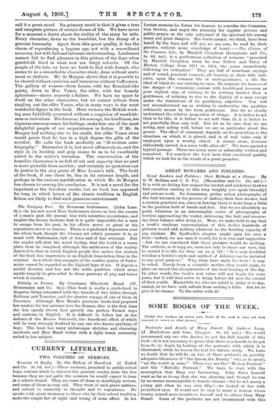Sermons at Rugby. By the Bishop of Hereford. (J. Nisbet
and Co. 3s. Cd. net.)—These sermons, preached to public-school boys, contain much to interest the general reader, none the less 'because they are not quite the sermons he would expect to hear in a school chapel. They are some of them so startlingly serious, and some of them so very sad. They treat of such grave matters, and exhort so earnestly to thought and to repentance. He speaks with great sternness to those who by their school tradition make the simple law of right and wrong of none effect. In his Lenten sermons he forces his hearers to consider the Commina- tion Service, and urges the necessity for regular private and public prayer as the only safeguard of the spiritual life among many and great dangers. His words cannot, we think, have been heard by the boys, and will not, we are sure, be read by their parents, without many searchings of heart.—The Claims of the Common Life, by Mandell Creighton (Longmans and Co., 35. 13d. net), is a posthumous collection of sermons "preached by Mandell Creighton when he was Fellow and Tutor of Merton College from 1871 to 1374, the years immediately following his ordination." They are full of trenchant sayings and of sound, practical counsels, all bearing, as their title indi- cates, upon the common life of undergraduates, a life the ideal of which he was striving to raise. He reminds his hearers of the danger of "remaining content with traditional decorum as your highest aim, of wishing to be nothing further than a gentleman, of refusing to rise to the dignity of a man except under the limitations of its qualifying adjective. You will not misunderstand me as wishing to undervalue the qualities ordinarily meant by the term gentleman. But let us clearly understand the relative proportion of things. It is better to act than to be idle, it is better to act well than ill, it is better to act gracefully than only well. But let us be sure that we are acting, and acting well, before we are so particular about the graces. The effect of ornament depends on its proportion to the structure on which it is placed, and is of real value only if employed upon a worthy object. A cherry stone, however elaborately carved, is a sorry trifle after all." We have quoted a typical passage. There are many more as admirably written and conceived. Yet somehow the book lacks that emotional quality which we look for in the words of a great preacher.






































 Previous page
Previous page